- Home
- Christopher Moore
Sacré Bleu Page 7
Sacré Bleu Read online
Page 7
“Whistler,” Manet called. “How’s your mother?”
The American bowed to the group and turned to greet his friend. He was a gaunt, dark-haired fellow about the same age as Manet, with an outrageous gondola of a mustache riding his lip and a monocle screwed into his eye like the brass porthole of a warship. He looked weaker, more pale than when they had last traded quips at Café Molière a year ago, and he was actually leaning on his walking stick as if lame, rather than wielding it as an accoutrement of fashion.
Whistler often joked about his puritanical mother, who reminded him with weekly letters that he was frittering away his life and the good family name by trying to live as a painter in London.
“Ah, Mother,” said Whistler in English. “She’s an arrangement in gray and black; her disapproval falls like a shadow across the ocean. And yours?”
Manet laughed. “Hiding in shame and praying for one of her sons to take up the law like our father.”
“Our mothers should share tea and disappointment together,” said Whistler.
Manet released his friend’s hand and turned his attention to the painting. “The Salon rejected this? She is so bold. So real.” The girl, in a long white gown, stood barefoot on the white fur of a polar bear rug, but beneath that was an Oriental carpet with a woven pattern of bright blue.
“My White Girl. She was turned down by the Salon and the London Academy. Her name is Jo Hiffernan,” said Whistler. “An Irish hellcat—skin like milk. Quick-witted for a woman, and a soul as deep as a well.”
“Oh, poor Jemmie,” said Manet, “must you fall in love with every woman you paint?”
“Nothing like that. The wench poisoned me and right there is the evidence.” Whistler waved up and down the painting. “I must have scraped the canvas a hundred times—started over. All that lead white soaks right through your skin. I still see rings around every point of light. My doctor says it will take months for my vision to return to normal. I’ve been in Biarritz by the sea, recovering.”
That explained it. Lead poisoning. Manet breathed a little easier. “The limp, then? Also lead poisoning?”
“No, last week I was painting on the beach and I was swept out to sea by a rogue wave—pounded in the surf. I would have drowned if some fishermen hadn’t rescued me.”
She glided between them like a petite storm, black lace trailing behind her. “Should have stayed in London and continued to shag the redhead on the bear rug, then?” she said in English, an Irish accent.
The little color Whistler had drained out of his face. “Beg pardon, mademoiselle—”
“A bear rug’s a sight more comfortable than the riverbank, eh, Édouard?” she said to Manet in French, squeezing his biceps. “At least she didn’t give him syphilis, non?”
Manet felt his mouth moving, but no words were coming out. The two painters, both notorious raconteurs, looked at each other, speechless.
“You two look like you’ve seen a ghost. Oh, there’s my uncle again. Have to go. Ta!”
She hurried off through the crowd. Whistler’s monocle dropped out of his eye and swung from the end of its silk cord. “Who was that woman?”
“How would I know?” said Manet. “Don’t you know her?”
“No. Never seen her before.”
“Me either,” Manet lied.
“She knew your name.”
Manet shrugged. “I’m known in Paris.”
He really didn’t know who she was. He didn’t even know what she was. He was suddenly feeling ill, and not because of the criticism of his painting. “Jemmie, this White Girl of yours wasn’t the painting you were working on in Biarritz when you had your accident, was it?”
“No, of course not. That was in the studio. The Biarritz painting was called The Blue Wave.”
“I see,” said Manet. “Of course.”
“So, Whistler, how’s your mother?” Hommage á Delacroix—Henri Fantin-Latour, 1864. (Whistler center, standing; Manet, standing center right; Baudelaire seated to Manet’s left. Fantin-Latour, the painter, seated in the white shirt.)
THE BLUE WAVE HAPPENED TO BE THE TITLE OF THE PAINTING THE COLORMAN carried, wrapped in butcher’s paper, under his arm as he hurried after the girl in Spanish lace.
“Where have you been?” He followed her out of the palace into the bright noon sun.
“Having fun,” she said, not missing a step. “Did you see them all? These young painters! They paint in the open air—in the sunshine. Don’t you know what that means?”
“Blue?”
“Oui, mon cher. Beaucoup bleu.”
Interlude in Blue #2: Making the Blue
For as long as there have been painters, there have been color men. For years it was thought that the true painter, a master painter, would gather his own pigments, the earths, ochres, insects, snails, plants, and potions that went into making color, and combine them in his studio. But the truth is, the ingredients for colors were often hard to find, difficult to prepare, and rare. To be a master, a painter needs to paint, not waste the light by searching for and preparing pigment. It was the color man who delivered the rainbow into the hands of the artist.
Ultramarine, true blue, the Sacré Bleu, is made from crushed lapis lazuli, a gemstone, and for centuries, it was rarer and more valuable than gold. Lapis lazuli is found in one place in the world, the remote mountains of Afghanistan, a long, dangerous journey from Europe, where the churches and palaces were being decorated with the Blessed Virgin wearing a Sacré Bleu gown.
It was the color men who sought out the lapis and pulled the color from the stone.
First they pounded the lapis with a bronze mortar and pestle, then that powder would be sifted until so fine the grains were not visible to the naked eye. The dull bluish-gray powder was then melted into a mixture of pine rosin, gum mastic, and beeswax. Over a period of three weeks, the putty would be massaged, washed with lye, strained, then dried, until all that was left was pure, powdered ultramarine, which a color man could sell as dry pigment, to be mixed by the artist with plaster for fresco, egg yolk for tempera, or linseed or poppy oil to use as oil paint.
There are other blues, blues from plants, indigo and woad, which fade with time, and inferior blues from minerals like copper and azurite, which can go black with time, but a true blue, a forever blue, ultramarine, was made in this exact way. Every color man knew the recipe, and every color man who traveled Europe from painter to painter with his wares could swear to his clients that this was the process he had used.
Except one.
Six
PORTRAIT OF A RAT CATCHER
Paris, 1870
WHEN LUCIEN WAS SEVEN YEARS OLD, WAR CAME TO MONTMARTRE. Because of the war Lucien became the Rat Catcher and had his first encounter with the Colorman.
Of course war had come to the butte before. In the first century BC the Romans had built a temple to Mars, the god of war, on the mount, and from that point forward, you couldn’t catapult a cow at Paris without someone setting up for siege on Montmartre. With her seven freshwater wells, her windmills, her vegetable gardens, and her commanding view of the entire city, everyone agreed that there was no better butte on which to be besieged.
And so it came to pass that Louis-Napoléon, feeling pressured by Chancellor Bismarck’s proposing a Prussian derrière be put on the throne of Spain (thus putting hostile forces on borders to both the north and south of France) and buoyed by his successful campaigns against Russia and Austria, plus the reputation of his illustrious uncle as the greatest military strategist since Alexander, declared war on the Prussians in July of 1870. By September, the Prussian army had kicked nine shades of umber out of the French and Paris was under siege.
The boulevards were barricaded and the Prussian army surrounded the city. The great Krupp guns fired sporadically, which did little more than keep the city’s national guard running from neighborhood to neighborhood to put out fires. Hot-air balloons were lined down the middle of the Champs-Élysées, prepared to try to s
muggle out letters as soon as night fell, and most would actually make it.
An early frost had dusted the cobbles of Place du Tertre that morning, as Lucien and Père Lessard stood at the edge of the butte, behind the iron fence that crowned the square, waiting for the loaves to be done, and watched French soldiers making their way up rue des Abbesses, pulling a hundred cannons with horses.
“They will store them in the Church of Saint-Pierre,” said Père Lessard. “And use them as a last resort if the Prussians try to take the city.”
“Maman says that the Prussians will rape and kill us,” said Lucien.
“Really, she told you that?”
“Oui. If the steps are not swept perfectly clean, they will rape and kill us all. Twice.”
“Ah, I see. Well, yes, the Prussians are a thorough people, but I don’t think you need to worry about it.”
“Papa, what is raping?”
Père Lessard pretended that his pipe had gone out and fumbled with a match against one of the iron fence bars as he tried to formulate a way to answer without actually having to answer. Had it been one of his daughters, he might have sent her back to her mother, but Madame had a way of implying to the boy that all the evils and plagues of man could be blamed, more or less, on the hapless baker of Montmartre, and he was in no mood to try to explain to his only son how he had invented rape.
And damn the match, it had burned all the way to his fingertips.
“Lucien, you have heard the term ‘making love’?”
“Yes, Papa, like when you and Maman are kissing and tickling and laughing. Régine said that is what you were doing.”
Père Lessard swallowed hard. It was a small apartment, but he always thought the children were asleep when—That spiteful woman and her giggling. “Yes, that’s right. Well, rape is the opposite. It is making hate.”
“I see,” said Lucien, mercifully satisfied with the answer. “Do you think we will get to shoot the cannons before the Prussians rape and kill us?”
“There will be no cannons for us. Our part of the fight will be feeding the hungry people of the butte.”
“We always do that. Perhaps Monsieur Renoir will come and fire the cannons, now that he is a soldier.”
“Perhaps,” said the baker. Renoir had been drafted into the cavalry, despite having been raised in the city and having never ridden a horse. A training officer who saw Renoir trying to handle horses took pity on the painter and hired him to teach his daughter how to paint, thus keeping him out of action. Monet and Pissarro had escaped to England. Bazille was training with the army in Algiers. Cézanne, the roughest of the lot, had gone into hiding in his beloved Provence.
“With all your pets gone, perhaps a suffering wife will at last be taken dancing?” said Madame Lessard. “In a new dress of white and black stripes, as was ordained by the Holy Father.”
“The Pope did not decree that you should have a striped dress to go dancing in, woman.”
“Well, perhaps now that your pets are gone, you’ll go to mass instead of drinking coffee all morning and talking about art, and you’ll know what the Holy Father said.” Madame Lessard turned then to her daughters, Marie and Régine, who stood by, pretending to mend stockings. “Have no fear, my ducklings, Maman won’t let you marry a heretic.”
“So I am a heretic now?”
“Who would say such a thing?” said Madame. “I will have their ears boxed by that sturdy doorman, Monsieur Robelard. I believe his price is two francs.” Madame held out her hand for the coins. “S’il vous plaît.”
Père Lessard dug into his pocket. Somehow, it seemed perfectly acceptable that he should pay Monsieur Robelard, the doorman at the Moulin de la Galette, to defend his honor against the accusation of being a heretic that no one had leveled. If nothing else, Père Lessard had the business sense of an artist.
Despite a siege on the city, Madame Lessard was saving for a black and white striped dress in which to be taken dancing. But there would be no dancing at the Moulin de la Galette, or any of the other dance halls in the city. The men who stayed in the city, even those who had been able to afford to send their families away before the Prussians arrived, spent their evenings and Sunday afternoons defending the barricades, and the women, when not hiding in the cellars, went about the business of feeding and caring for their children. The grocers, butchers, and bakers went about trying to provide for the Parisians when there was nothing left to provide.
The chickens and ducks pinned in the backyards of Montmartre disappeared first. The ducks and most tender yard hens in the beginning, but once the feed grain was gone, even the laying hens were short for the pot, until not even a single time-toughened rooster remained unstewed to announce the dawn. With no trains to bring livestock from the country, the butchers for Paris’s great Les Halles marketplace spent their days in cafés with their ham-sized fists wrapped around delicate cordial glasses of Pernod, until that, too, was gone. Montmartre’s two milk cows, belonging to Madame Jacob of the crémerie, were spared for a while because they could graze on the back slope of the butte and in the fencerows of the Maquis, the shantytown by the cemetery, but when the grass was nibbled to nubs and the National Guard’s horses were being slaughtered for meat, then even the sad-eyed Sylvie and Astrid found their way into the pot-au-feu, which Madame Jacob salted with her tears.
As the siege had fallen in the autumn, every vegetable garden in Montmartre and the Maquis was brimming with maize and snail-scarred squash, but two weeks after the Prussians arrived, with nothing coming into the city from the countryside, only the root vegetables remained, and those so rare that a gentleman in possession of a turnip might find himself in the company of a brace of Pigalle harlots, eager to exchange a full evening of lubricious charms for the promise of a demi-tuber.
When the Prussian guns first thundered in the distance, Père Lessard knew what was coming, so he bought all the flour he could find, then gathered a dozen empty flour sacks from the storeroom and led Lucien down the butte to a cooper’s shop tucked among the factories of Saint-Denis. There, for the price of asking, they were able to fill their flour sacks with the fine oak sawdust.
“You will use it to fire your ovens, no?” said the barrel maker. “Very smart. Burns very hot. But be careful. It can be explosive if the air is filled with it.”
“Yes, like flour,” said Père Lessard. “I will be careful.” He hadn’t thought of using the sawdust to fire the ovens. He shook the cooper’s hand, then hired a ragpicker with a donkey cart to haul the bags of sawdust up the butte.
“If strong French oak is good enough for our wine, it will be good for our bread, too,” he said to Lucien as they wound their way up Montmartre behind the cart. “The trick is to use no more than a quarter sawdust or the dough will not rise. But for piecrust, you can go as much as half.”
“How did you know to use sawdust, Papa?”
“Ours is a very old profession, and no one wants to hear excuses why the baker does not have wares, so we learn tricks. Why, once there was a pair of bakers on the Île de la Cité that were killing and baking foreign students from the Sorbonne into pies. And no one who bought the pies ever complained. Only a German father who missed his son and came to investigate his disappearance finally found them out. Cannibalism, right there on the doorstep of Notre-Dame.”
Lucien’s eyes had grown as big as his fists at the horrific prospect of what Father was proposing. “But, Papa, I don’t think I’m big enough to make students into pies. Perhaps you should have Marie and Régine do it. They are taller.”
“Oh, we won’t start you out on students, Lucien. They are quick and hard to knock on the head. We’ll start you out with something easier, a grandmother, I think.”
Lucien was having a hard time catching his breath. Why was the ragpicker smiling? Maybe he was going to be in on it. Maybe he would haul the grandmother to the bakery. Which was good. Lucien knew that unless he picked a grandmother who lived on Montmartre, he’d never get her up the hill
without help.
“Maybe I can just ask a grandmother to come to the bakery. I could make up a story of how Maman needs help, and—”
“Oh, that won’t be necessary, Lucien. You’ll just conk her on the head. That is the proper way.”
The ragpicker nodded, as if it was well-known that conking a grandmother on the head was the accepted method.
Tears began to well in Lucien’s eyes. “I don’t want to. I don’t want to conk a grandmother. I don’t want to. I don’t want to. I don’t want to.”
“Eh, war is hell,” said the ragpicker.
Père Lessard tousled Lucien’s hair, then pulled the boy’s head against his hip in a hug. “Shhhh, son, stop crying. I’m just fucking with you.”
Now the ragpicker threw his head back and laughed in the way only a Frenchman with seven teeth and a conscience soaked in wine can laugh, the sound his donkey might make if he were a heavier smoker and had just licked the devil’s ass to chase all taste of goodness from his tongue. The ragpicker wasn’t a scoundrel, but scoundrels envied his laugh.
Humiliated, horrified, and not a little out of breath, Lucien flailed at Father with his fists; the first bounced harmlessly off the baker’s bottom, the second plowed solidly and with great force into Père Lessard’s testicles, and in that instant, time stopped for the baker, and even before the breath left his body and he crumpled to the ground in pain, he thought, The boy has his mother’s sense of humor.
As Lucien ran up the hill toward home, Père Lessard said to the ragpicker, “He’s a sensitive boy. I think he should be an artist.”
Madame Lessard met him at the top of the stairs, her hands on her hips, her chin jutting like the prow of a warship. “So, you will have my son bake my mother into a pie, will you?”

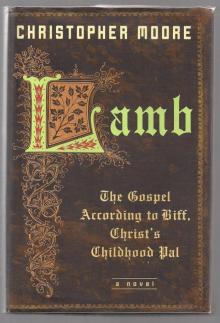 Lamb: The Gospel According to Biff, Christs Childhood Pal
Lamb: The Gospel According to Biff, Christs Childhood Pal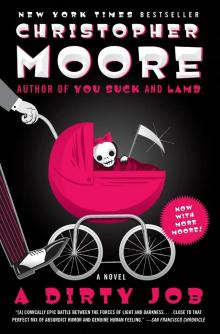 A Dirty Job
A Dirty Job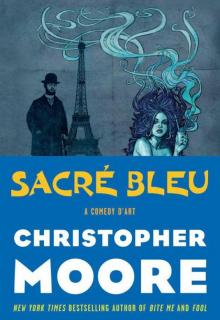 Sacré Bleu
Sacré Bleu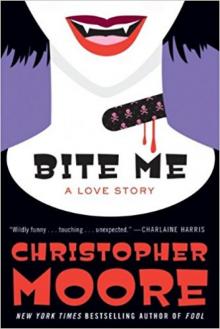 Bite Me: A Love Story
Bite Me: A Love Story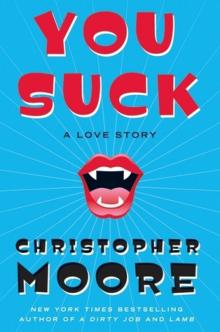 You Suck: A Love Story
You Suck: A Love Story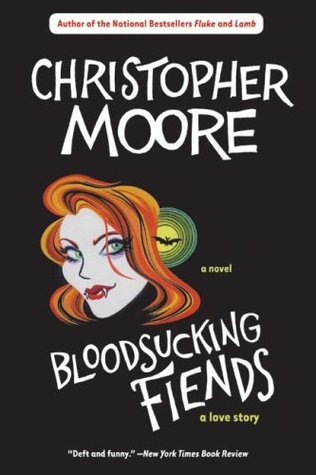 Bloodsucking Fiends: A Love Story
Bloodsucking Fiends: A Love Story The Stupidest Angel
The Stupidest Angel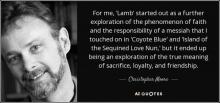 Coyote Blue
Coyote Blue The Lust Lizard of Melancholy Cove
The Lust Lizard of Melancholy Cove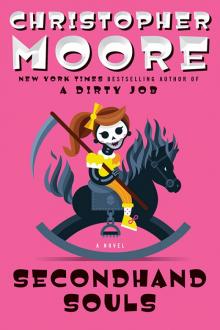 Secondhand Souls
Secondhand Souls Shakespeare for Squirrels
Shakespeare for Squirrels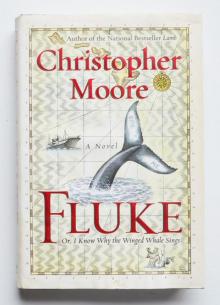 Fluke, or, I Know Why the Winged Whale Sings
Fluke, or, I Know Why the Winged Whale Sings Island of the Sequined Love Nun
Island of the Sequined Love Nun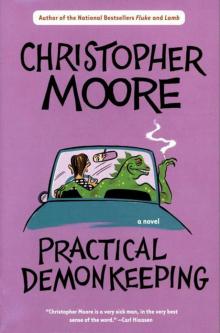 Practical Demonkeeping
Practical Demonkeeping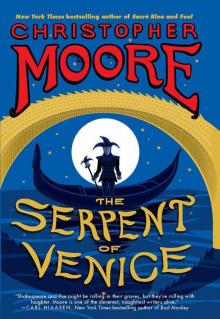 The Serpent of Venice
The Serpent of Venice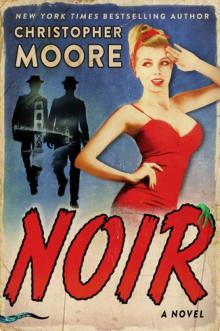 Noir
Noir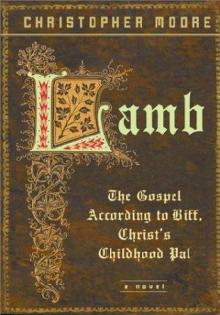 Lamb: The Gospel According to Biff, Christ’s Childhood Pal
Lamb: The Gospel According to Biff, Christ’s Childhood Pal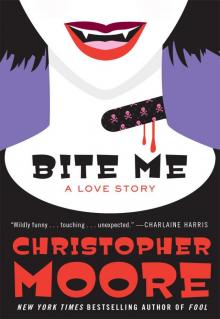 Bite Me
Bite Me Bloodsucking Fiends
Bloodsucking Fiends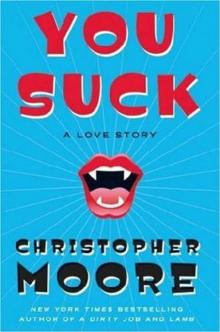 You Suck ls-2
You Suck ls-2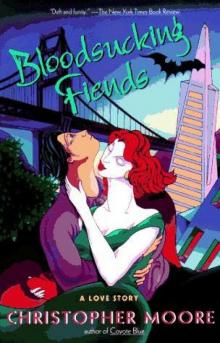 Bloodsucking Fiends ls-1
Bloodsucking Fiends ls-1 The Stupidest Angel: A Heartwarming Tale of Christmas Terror
The Stupidest Angel: A Heartwarming Tale of Christmas Terror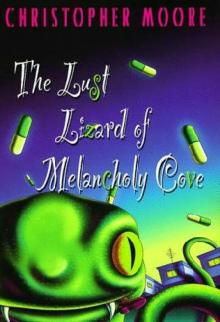 The Lust Lizard of Melancholy Cove pc-2
The Lust Lizard of Melancholy Cove pc-2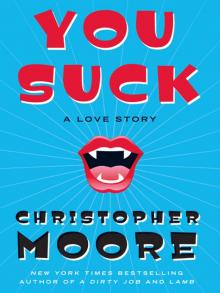 You Suck
You Suck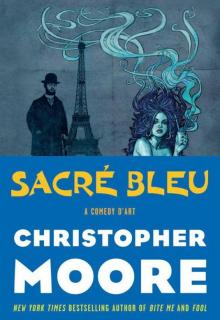 Sacre Bleu: A Comedy d'Art
Sacre Bleu: A Comedy d'Art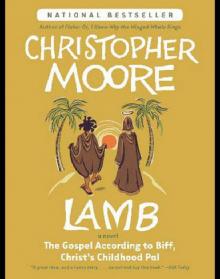 Lamb
Lamb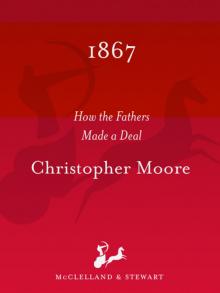 1867
1867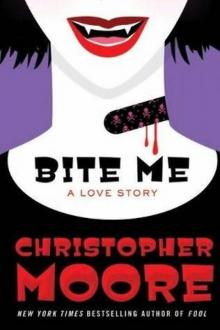 Bite Me ls-3
Bite Me ls-3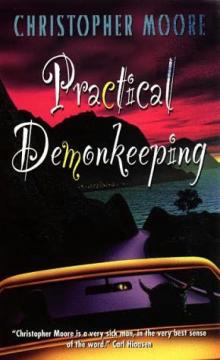 Practical Demonkeeping pc-1
Practical Demonkeeping pc-1